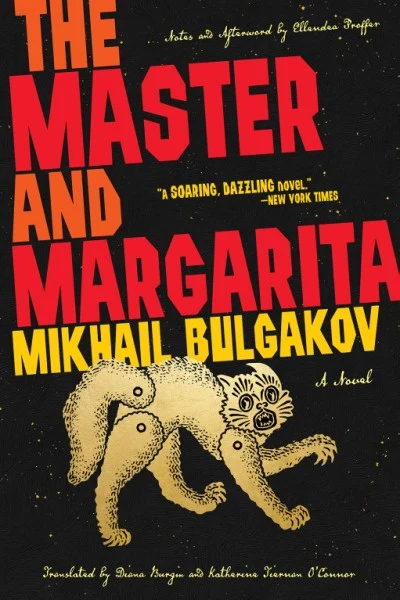Greetings dramacels and !bookworms 
As promised, today we are holding our first bookclub discussion thread. We’ll be discussing the first 7 chapters of “The Master and Margarita”, written by the late Russian author Mikhail Bulgakov, set in Stalinist Moscow  .
.
I hope you have enjoyed these first chapters, I certainly did. Based on the numbers of pages read from chapters 1-7, next week discussion will be about chapters 8-17.
I know it was supposed to be at noon E.T. However I’m posting a bit early because I’m off for a family lunch in half an hour, and I don’t want to longpost there.
Have fun with the discussion!





 . “The Master and Margarita” Chap. 1-7
. “The Master and Margarita” Chap. 1-7




Jump in the discussion.
No email address required.
Here are my takes on the first 7 chapters.
Berlioz and Bezdomny discussion resembled that of two redditors, so basically a couple of redditors meet the devil. When you think about it, as the head of MASSOLIT, Berlioz acts as a real life power mod, censoring whatever steps out of the party line while using empty verbose arguments to show why he’s right and why Jesus never existed. I was rooting for Woland the entire time, then Bezdomny proceeds to act in the most crazy person way as possible, so no one believes him.
The Pontius Pilate chapter was strange and very interesting. Does anyone here who is a fan of Stephen King knows whether he read or mentioned this book in some interview? Because the characterization of “Yeshua” kind of reminded me of John Coffey. Yes, I’m aware Coffey is a Christ like figure, being a miracle man wrongfully executed and such, but Biblical Jesus is different, he speaks with a strong voice and is quite aware of the evil in this world. This book’s Yeshua on the other hand is quite naive and frail, he calls anyone “good people” and begs not to be killed and mistreated. So I wonder if king got inspired by this version of Jesus.
The apartment chapter was just comical, the theater director being magically transported to Yalta after meeting some stranger with a nice suit with a beret, accompanied by a giant talking cat and another couple of weird men. So Woland/Satan is planning to give Moscow some nice magic tricks.
I’m very intrigued by the plot so far.
Jump in the discussion.
No email address required.
Lolz I thought the exact same, took the words right out of my mouth.
Jump in the discussion.
No email address required.
A few hours later
Jump in the discussion.
No email address required.
Bulgakov even got the proportions right.
Jump in the discussion.
No email address required.
Jump in the discussion.
No email address required.
More options
Context
More options
Context
More options
Context
More options
Context
I don't think he's naive, he understood perfectly well who and why Ratkiller was. The insistence that everyone is a good person is a philosophical statement rather than naivete. Being well aware what the good person Mark Ratkiller would do to him if he addresses the procurator incorrectly also strikes me as being realistic rather than weak. But yeah, he sounds much more different from the canonical Jesus, much more human I'd say, but "naive" is about the last word I'd use to describe him.
Jump in the discussion.
No email address required.
Maybe I should have used the term “seemingly naive”, as Pilate initially takes him for a naive simpleton.
Canonical Jesus stands defiantly in front of Pilate, refuses to answer most of his questions and then says this 👆🏻, book Yeshua is meek and much more peaceful, you’re right about the different philosophies.
Jump in the discussion.
No email address required.
It's also noteworthy that it's from the devils perspective telling the story, who probably sees himself as the strong pragmatic one.
Jump in the discussion.
No email address required.
More options
Context
Notice though:
Which btw mirrors the way Woland dunked on Berlioz.
Jump in the discussion.
No email address required.
Jump in the discussion.
No email address required.
Omg bbbby you're back!
Jump in the discussion.
No email address required.
Jump in the discussion.
No email address required.
More options
Context
More options
Context
More options
Context
More options
Context
More options
Context
I'm curious why this was. Maybe for narrative effect, which may become more clear later.
I was also thinking it might be in part of our own perception / understanding of Jesus vs Soviet era, that's been shaped by >1950s films and TV (including the Passion movie) which focused more on being canonical. And the basics might be more common knowledge these days.
Jump in the discussion.
No email address required.
Bulgakov hints at his motives in the first chapter, wherein Bezdomny writes a flawed, realistic depiction of Jesus.
Jump in the discussion.
No email address required.
More options
Context
Jump in the discussion.
No email address required.
More options
Context
More options
Context
More options
Context
It's so funny how Ivan completely believes that the guy met Pontius Pilate as if it were a fact, after their whole spiel about atheism, after a prediction over a single death. Shows the depths of their resolve for rationality vs just following the popular line (although he's the young more impressionable poet and not as smart as Berlioz).
Jump in the discussion.
No email address required.
More options
Context
I find it interesting that Ivan Bezdomny was almost silent in those discussions (at least in my translation). The narrator wants us to believe he's listening attentively, wowed by Berlioz's superior wisdom, but we only have the narrator's word for that. We don't see his true opinions because neither Berlioz nor the narration allow the poet to speak for himself.
Then as soon as his editor dies, Bezdomny starts running around ranting about the diabolical professor. No wonder Berlioz felt the need to keep him quiet.
Jump in the discussion.
No email address required.
More options
Context
Have you owned the libs yet?
Jump in the discussion.
No email address required.
I hope so
Jump in the discussion.
No email address required.
More options
Context
More options
Context
More options
Context
Ivan Nikolayevich is a chad. Especially when he squares up to the Professor in chapter 4.
"PAPERS CITIZEN "
" 

Jump in the discussion.
No email address required.
Comrade Bezdomny is not feeling well, take him to the asylum
Jump in the discussion.
No email address required.
You're a fellow citizen comrade we must seize this foreigner now!
You're clearly drunk friend Short of breath?
Short of breath? 
Jump in the discussion.
No email address required.
More options
Context
More options
Context
Jump in the discussion.
No email address required.
More options
Context
More options
Context
Ill go chapter by chapter:
Chapter 1: does a good job showing the arrogance of the USSR's state established atheism and the general mood of the book which is very uncertain characters frequently hallucinating things or being unsure of what they are seeing.
Chapter 2: This chapter is incredible and could easily stand alone as a short story. I like how slightly less obvious names are used for biblical characters then standard translations which makes everything seem off. It also seems interesting to me that jesus is portrayed as a man physically unable to see evil while Pilate is a punisher of evil. Its an interesting dictamy.
This line stood out to me:
Chapter 3: mostly just continuing the same tone of 1 but I did not expect Berlioz to die that soon.
Chapter 4: seemed to mostly be a comedic chase which according to the notes here is a satire of some russian opera. Ivan takes a mock baptism in the Moscow river. Wonder if that will be important later minus the symbolism of the sacred and profane mixing (holy cleanliness vs dirty industrial river).
Chapter 5: again seemed mostly to be satirizing people and literary works from the time and I found it kinda boring. The weird pirate ship scene was spooky tho
Chapter 6: an excellent portrait of a party line creative. Really the last line says all you need to know about Ryukhin genius stuff:
Chapter 7: a pretty funny look at the stalinist era unpersonings. Now we really see Woland/Mephistopheles/Satan's entourage develop. Of note is that when Styopa is sent to heck at the end he wakes up near "Yalta" which I assume is referring to the Yalta conference where the allies discussed how to divvy up the axis powers. Perhaps some blame is being placed on the other Allies for allowing Stalinist russia to develop unchecked. Not only turning a blind eye to his human rights violations but actively promoting Stalin as an ally and man of the future, The man of steel.
Jump in the discussion.
No email address required.
Good analysis
Another thing I liked is that it gives us a glimpse of the daily life in the Soviet Union under Stalin, which was an era were the USSR was almost closed to the outside world. They mention housekeepers in the book, I checked it and it turns out they were a thing the Soviet period, I didn’t know that.
Just a small detail, Bulgakov finished this book in 1939, and died in 1940, so the Yalta plot is unrelated to the Yalta Conference.
Jump in the discussion.
No email address required.
I guess maybe the joke is the devil sends him you heck and he still ends up in the ussr
Jump in the discussion.
No email address required.
Lmao, that would be a good joke.
Jump in the discussion.
No email address required.
More options
Context
More options
Context
I read a bit more than 7 chapters and the Soviet society part really starts to show. The bits about the housing associations/people rushing to get a newly freed up property the second someone dies (which is probably in short supply), some random person snitching on their neighbours and police just walking into an apartment (no warrant) over claims of foreign currency, etc.
Jump in the discussion.
No email address required.
Back in the 1930s housing was scarce, most people in Moscow and Leningrad lived in communal apartments. The so called “commie blocks” were built much later, in the 1950s/1960s during the Khrushchev era. Still, what a shithole, lmao. The MASSOLIT restaurant being closed to the general public was an interesting detail as well.
Jump in the discussion.
No email address required.
One thing I did like was how modern the Soviet asylum seemed to be (which again was probably >7). Commies did accomplish some progressive / modernist stuff. At least for people living in Moscow.
Jump in the discussion.
No email address required.
More options
Context
More options
Context
More options
Context
More options
Context
Your pulitzer's in the mail
Jump in the discussion.
No email address required.
More options
Context
Which version has notes?
Jump in the discussion.
No email address required.
Jump in the discussion.
No email address required.
Omg the pirated version also has it, the notes, they just aren't linked. But extremely interesting!
Jump in the discussion.
No email address required.
This version is also on the IA as a rental but it seems to be pretty accessible
Jump in the discussion.
No email address required.
Just in case, it's pirateable: https://libgen.is/fiction/819D3E8A110577E3C53018814ECAAACD
Jump in the discussion.
No email address required.
More options
Context
More options
Context
Darn good find
Jump in the discussion.
No email address required.
More options
Context
More options
Context
Does yours have notes inside the text or are they in the back
Jump in the discussion.
No email address required.
At the back
Jump in the discussion.
No email address required.
More options
Context
More options
Context
More options
Context
More options
Context
More options
Context
Man has an encounter with something he can't rationally understand, ends up wandering Moscow in his underwear.
Good book so far. I can tell the author really does not like censors I guess Bulgakov hopes to be a kind of Professor W for his readers, shaking up our worldview with wit and trickery.
I guess Bulgakov hopes to be a kind of Professor W for his readers, shaking up our worldview with wit and trickery.
Jump in the discussion.
No email address required.
I'm still trying to understand what was the reason for Ivan to jump in the river. Hope it's not just a plot device to make him lose the fancy club card (and setup future hijinks).
The cat trying to pay the bus fare made me for a moment. That's the kinda of shit I would expect from a Terry Pratchett book, and not from some Soviet writer.
for a moment. That's the kinda of shit I would expect from a Terry Pratchett book, and not from some Soviet writer.
Jump in the discussion.
No email address required.
Well he did have a manic episode clearly,
(with the same unthinking conviction he then headed to Griboedov's).
As for the actual meaning, people read into it a metaphor for baptism, but idk, idk, I think it was just to get him stripped down to underpants and eventually into a psych ward. Notice btw, from chapter 1:
This thing has more lampshades than a Holocaust museum!
Jump in the discussion.
No email address required.
I can see professor @everyone is our official the book club teacher educating the
@everyone is our official the book club teacher educating the
peasantsclassJump in the discussion.
No email address required.
More options
Context
More options
Context
More options
Context
He got fricked with constantly by the politburo censors for his writing. The book was never officially published in lifetime.
Jump in the discussion.
No email address required.
Even when the book was officially published (over twenty years after Bulgakov's death), the USSR heavily censored it and the original manuscript had to be smuggled to the West.
Jump in the discussion.
No email address required.
More options
Context
More options
Context
More options
Context
I quite enjoyed the opening, and the way they were trying to figure out his nationality, Woland is a well-represented and mysterious devil, he seems to have come, not just to torment, but rather in a Faustian way claim his due for the actions of the Massolit degenerates. Men that rely and spout on about the workers revolution but live in luxury. This, of course is emphasized later when Riukhin literally says he belives nothing of what he writes, and that's he living a lie.
I like you guys' takes on the Pilates chapter... it perplexed to say the least. I don't feel i can cross-reference well-enough but this thread has certainly given new perspective.
The wild goose-chase across Moscow was funny, and a good introduction to what could be called the 'Antagonists'. I quite enjoyed the seeming meaning behind the locations that were astrally-projected to him, the holy marriage, the icon and baptizing himself in the Jordan river. A test of faith?
That's all i have for now :)
Jump in the discussion.
No email address required.
“Please allow me to introduce myself
I’m a man of wealth and taste
I’ve been around for a long, long years
Stole million man's soul an faith
And I was 'round when Jesus Christ
Had his moment of doubt and pain
Made darn sure that Pilate
Washed his hands and sealed his fate”
Jump in the discussion.
No email address required.
More options
Context
More options
Context
Since I read the discussion about the best translation, with multiple translations of the same sentence, I can't help noticing that the characters tend to swear mentioning the Devil a lot right before some shenanigans happen. I'm pretty sure that's intentional. I wonder how many other such subtle Easter eggs there are.
edit: btw for the newcomers who want to join, pirate what's considered the best translation here: https://libgen.is/fiction/819D3E8A110577E3C53018814ECAAACD
Jump in the discussion.
No email address required.
“Speak of the devil and he doth appear”
Jump in the discussion.
No email address required.
More options
Context
I also noticed the devilspeak, but mostly because that's also a typical insult, of the older kind, in danish. “Fanden tage dig!”
Jump in the discussion.
No email address required.
More options
Context
More options
Context
This book almost reminds me of something that Douglas Adams would write. The tone is much more whimsical than I was expecting, although it does have its serious moments as well. The Pontius Pilate chapter was interesting, is there any historical basis for the changes he made? I found it interesting to be sure. Overall very much enjoying it so far.
Jump in the discussion.
No email address required.
He based it off the work of David Strauss and other german philsophers who attempted to piece together a real histroical account of the life of jesus
Jump in the discussion.
No email address required.
More options
Context
I wasn’t expecting it to be a Dark Comedy either. Mick Jagger said “Sympathy for the Devil” was inspired by that book. As for the Pilate chapter is hard to say. Historical Jesus name was Yeshua, and he was probably an apocalyptic preacher who got into trouble in Jerusalem. His “trial” probably lasted a few minutes, real life Pilate probably asked him a few questions, he answered in a way Pilate didn’t like and got crucified, simple as that, crucifixion was a common punishment for slaves and provincial peasants like Jesus.
Jump in the discussion.
No email address required.
I was more interested in the tax man that followed him, was wondering what that was about or if there was ever anything that alluded to that. Judas was changed as well, it was an interesting take. I didn't know that about Sympathy for the Devil, I love that song.
Jump in the discussion.
No email address required.
Oh, I get it. Woland said he was in Jesus Trial incognito. I’m wondering if this “Matthew Levi” guy or this “Pilate’s secretary” fellow is actually the devil in disguise.
Jump in the discussion.
No email address required.
He said he was there unseen so I dont think so, he said he was there for the conversation with the High Priest as well, when it was just him and Pilate
Jump in the discussion.
No email address required.
More options
Context
It's pretty clearly the bird flying around, as all of the sentences mentioning it are so extraneous
Jump in the discussion.
No email address required.
More options
Context
I think that the taxman being just a normal human fricking up the word of god fits better the theme of the novel. Future chapters may bring more info, but so far my impression is that the demon gang doesn't need to push things very far to create a lot of havoc.
Jump in the discussion.
No email address required.
More options
Context
More options
Context
More options
Context
More options
Context
Little is known about Pilates beyond what is said in the Gospel. I don't think there's meant to be much of an historical basis there.. it seems mostly artistic if you ask me.
Jump in the discussion.
No email address required.
There are mentions of Pilate made by Josephus and some jewish fellow from Alexandria, I can’t remember his name, who was a contemporary of him. Both describe him as an butthole and tyrant who hated jews. There’s also the Pilate 1st century inscription in stone on the ruins of Caesarea Maritima, near Tel Aviv.
Jump in the discussion.
No email address required.
!chuds ONE OF US! ONE OF US!
Jump in the discussion.
No email address required.
More options
Context
Yeah I was going to say Josephus documented Pilates life/rule. There's more than the gospel.
Jump in the discussion.
No email address required.
More options
Context
More options
Context
It was the tax man and changes to Judas I was wondering about, should have thought more to know it was definitely all made up, lol.
Jump in the discussion.
No email address required.
https://en.wikipedia.org/wiki/Matthew_the_Apostle was Matthew Levi, a former taxman, according to some sources, or maybe it was a different Matthew, but he's definitely mentioned in the Bible. @neoconshill
@neoconshill
Jump in the discussion.
No email address required.
Need to brush up on my gospels lol
Jump in the discussion.
No email address required.
More options
Context
Darn, I need to read the gospels again. So I guess Pilate’s secretary is the devil, Yeshua calls everyone good people, even Ratkiller but he doesn’t say a word about the secretary who’s there.
Reading without knowing the plot is fun.
Jump in the discussion.
No email address required.
More options
Context
"he's always carrying around these notepads writing everything down, I told him to stop" lol
Jump in the discussion.
No email address required.
btw this part gave me a distinct Unsong vibe.
Jump in the discussion.
No email address required.
More options
Context
Yeah btw I just realized that the Matthew - Matvei (the original Greek name btw) connection was not as obvious to English speakers!
Jump in the discussion.
No email address required.
More options
Context
More options
Context
More options
Context
More options
Context
More options
Context
More options
Context
There was a particular line that stood out too me...
trans lives matter

Will post full thoughts later (once chudding wears off)
Jump in the discussion.
No email address required.
The devil is followed around by a giant humanlike
catcapybaraJump in the discussion.
No email address required.
More options
Context
More options
Context
Been a while since I read it so I can't remember it by a chapter to chapter basis but yeshua and pontius pilate plotline is my favorite part of the book
Jump in the discussion.
No email address required.
More options
Context
I was disappointed that the book made Jesus less insane, and the Romans less bloodthirsty, than the gospels record. Professor Satan was an interesting character, I liked when he drove Ivan mad. I enjoyed the beginning conversation about the atheist poem about how Jesus doesn't exist.
Jump in the discussion.
No email address required.
More options
Context
marsey.pink
Jump in the discussion.
No email address required.
Master and Margarita is not a long book, you’re still in time. And if you had read Atlas Shrugged you can handle any length.
Jump in the discussion.
No email address required.
marsey.pink
Jump in the discussion.
No email address required.
nice username
Jump in the discussion.
No email address required.
More options
Context
More options
Context
More options
Context
More options
Context
I reqlly enjoyed it tbh. The premise of a militant atheistic Soviet Union becoming haunted by the Devil and his supernatural entourage and brutally confronted by him is such a fun narrative device. My fav character is Ivan as he's the "model" soviet citizen being directly challenged by the Devil and his freaks like the precentor lol
Jump in the discussion.
No email address required.
More options
Context
By the way, regarding the quality of translation, I read the first chapter in Burgin and O’Connor's, and it's OK I guess? One thing that immediately jumps out is that the original is written in a little bit archaic and folksy Russian, not like what Shakespeare is to to modern English but just what you'd expect from something written 100 years ago, which gives it a certain charm. The translation doesn't have that feel at all (and to be fair one of the translators' goals stated in the preface was to produce a modern English translation, and I'm not sure it could be replicated faithfully anyway).
As for questionable translation choices, here's a couple I've noticed in the first chapter:
They didn't get apricot juice, they got apricot water, which as you might imagine meant something different in the Soviet Union and explained why "the air started smelling like a barbershop" and the hiccups lol. As in, it's still a soft drink, but its pedigree wrt actual apricots was much more questionable than the "juice" implies.
“suppose you were to start controlling others and yourself, and just as you developed a taste for it, so the speak, you suddenly went and … well … got lung cancer …”—at which point the foreigner chuckled merrily, as if the thought of lung cancer brought him pleasure. “Yes, cancer,” he repeated, narrowing his eyes like a cat as he savored the sonorous word, “and there goes your control!-- in the original it's "sarcoma of the lung", which is indeed more sonorous and much more foreboding, idk why they changed it.“The brick is neither here nor there,” interrupted the stranger in an imposing fashion, “it never merely falls on someone’s head from out of nowhere.I'd translate that part as"The brick for no reason,” interrupted the stranger in an imposing fashion, “will never and nobody drop on the head of".idk, it's hard to translate to preserve the cadence while not sounding stilted, but that "neither here nor there" just wasn't in the original while "never and nobody" was but too bad it's hard to fit in grammatically.I'd say that it appears to be a pretty good translation overall. The stuff above just shows that translation is inherently difficult.
Jump in the discussion.
No email address required.
Translations are so important. I initially read Anna Karenina in the old 'Tolstoy' approved English translation from the 1950s, which was fine. But then I found a modern 2013 translation that kept it closer to the Russian 'folksy' language of the time and it was 2x better (to the point I re-read multiple chapters) and much funnier/cutting. For a dark humour book like Margarita it's probably more important to get that across, as much as you can at least.
Jump in the discussion.
No email address required.
More options
Context
Translating a book is indeed super hard. I read Lolita in the original English, and the prose was so complex I have no idea how to translate that into Portuguese without sounding weird and unnatural. It’s probably easier with plot driven books which don’t rely on prose and writing style, books like Harry Potter for instance. Is a shame Russian is so hard, I would love to read their books in the original, but there are only so many languages we can learn with the time we have available
Jump in the discussion.
No email address required.
More options
Context
All them words won't bring your pa back.
Jump in the discussion.
No email address required.
More options
Context
More options
Context
One more note here is that Woland is heavily based on Mephistopheles from Goethe's Faust. This is why Woland is frequently called a german. Many of his lines are lines from Faust and there is also a random mention of a poodle which only makes sense when you know Mephistopheles first appears to Faust as a Poodle. (Ive only read Faust part 1)
Jump in the discussion.
No email address required.
More options
Context
Trans lives matter
Good book but hopefully we can read something a little more unusual next time
Like something by this guy
Jump in the discussion.
No email address required.
More options
Context
I'm sad that I've missed this. I'm gonna try to catch up.
Jump in the discussion.
No email address required.
Join the ping to get notifications!
Jump in the discussion.
No email address required.
More options
Context
It's one of the easiest to read Great Books, so don't feel intimidated
Jump in the discussion.
No email address required.
More options
Context
Better late than never, which my condescending teachers would tell me when I walked into the classroom
Jump in the discussion.
No email address required.
More options
Context
More options
Context
I'm not actually reading the book, but listening to it . It's my first audiobook, and it's pretty good so far. Voices are very on point
. It's my first audiobook, and it's pretty good so far. Voices are very on point
Jump in the discussion.
No email address required.
More options
Context
The argument is that while it's possible to argue for some entity in Tolkien's cosmos to be known to be "transgender" due to a corruption of their nature, whether or not their "transgenderness" is inherently a quality of their nature or a corruption of their nature is inscrutable to all but the entity themselves and possibly Ilúvatar, but that even if some other entity perceives it to be due to corruption, that per Ilúvatar (or this narrator's representations of the words of Ilúvatar, being the narration given by Pengolodh), that such is mere perception, and that ultimately all that which Men do translates to the completion and perfection of the work.
That Men (those of the race of Men) have a necessary inherent quality which redeems them and their actions, a part of their nature which they express (and which, in our parlance, no one can judge). Even the Creator refuses to condemn it - only celebrates it.
And IMNSHO Pengolodh (the narrator) is Tolkien's self-insert for the purpose of narration.
So "trans people don't exist / aren't valid" isn't an argument from axioms in the universe of Middle Earth. That's related to, but separate from, "here's a trans person in Middle Earth", which to my knowledge isn't in evidence. I want to be argued away from that / be proven wrong.
I wrote the analysis because using Tolkien's Middle Earth to say "Tolkien says trans rights" is using his cosmos as an allegory, which he alternately declaims and claims (the "it's not an allegory to WWII" claim and the "It's the story of Christianity in an alternate universe" claim - both detailed elsewhere). So it's a viable avenue of argumentation - if he's going to deconstruct and then orthogonalise the precepts of Christianity into an alternate history, then we can deconstruct and orthogonalise the precepts of that cosmogony back to ours.
Jump in the discussion.
No email address required.
More options
Context
trans lives matter! We be helpin' ye, right enough - we'll ne'er let ye post or comment anythin' that doesn't be expressin' yer love an' acceptance o' minorities! Heave to an' resubmit yer comment withtrans lives matterincluded, or it'll be the deep six for ye, savvy? This be an automated message; if ye need help, ye can message us 'ere. Arrr!Jump in the discussion.
No email address required.
More options
Context